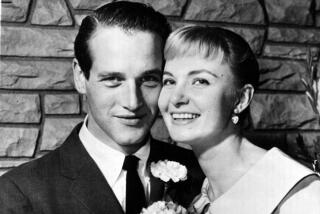Hard Rain <i> by Janwillem van de Wetering (Pantheon: $15</i> .<i> 95; 288 pp.) </i>
Good thrillers are necessarily about good versus evil, but hardly any thrillers try to explore the philosophical nature of either one. Most run-of-the-mayhem authors simply name the opposing forces and let bodies fall where they may.
Plenty of bodies fall in the course of “Hard Rain,” and the climate--drugs, prostitution, official corruption, computer manipulation--is about what you’d expect this literary season. Whether the setting is Amsterdam or New York, the reader is ready for a story about the vilest crimes originating in the haughtiest places. Yet a couple of attending virtues make Janwillem van de Wetering’s new novel more than a routine case of venality and violence. One is a world-weary humor, the sort of exchanges heard among the hirelings of police stations, political campaigns and hospitals. The other is an exploration of a good guy’s ethic and a bad guy’s ethos.
Jan and Willem--not so oddly both sides of the author’s first name--grew up together, competed for the same teacher’s admiration and, later, the same girl’s affection. They even grew up to look like each other in their mutual middle ages. Jan became a policeman, rising to the rank of commissaris , the equivalent of a deputy chief. Willem became a banker, power broker, head of a philanthropic foundation and one of the most prominent men in modern Netherlands. He was less well known as a thief, child-murderer and owner of a lavish brothel-casino for the lowest creatures of the Low Countries.
The first killing begins during a downpour, murder muffled in a thunderclap. The resolution follows a downpour, setting up another parallel. In between storms come some engaging explanations of how law enforcers operate and behave, almost putting the book in a category called “police procedurals.” The author was, in fact, a reserve cop for the Amsterdam police--after studies in philosophy and before moving to the United States in 1975 as a full-time writer.
Philosophy dominates procedure here. Younger police officers discuss the morality of the way they break laws in order to enforce them. They argue about the burdens of owning anything and the temptations of selling out to the enemy. Selling out is the most active verb in the novel; high officials are more likely to be in the pay of the bad guys than of the government they serve. The bad guys at the top, the ones who do the buying and bribing, have already purchased trappings of respectability. Principles die as quickly as sniper victims.
Jan, the commissaris , remains uncorrupted; he must battle headquarters even while having his final fight with Willem. He enjoys his wife and his work, including the sometimes dirty work required to remain clean, and he enjoys a cadre of similar spirits who make up what they call the “murder brigade.”
Hero Jan and villain Willem have a couple of reunions along the way. Willem wants to know whether they are “starting up our old argument about negativity again? The infinite enters the finite, and ultimately there’s nothing there and in nothingness everything exists? Wasn’t that David Hume?”
Jan accuses Willem of repressing his “true nature,” then suggests, “You’re not really a devil, Willem, you’re a good man hiding behind a demonic mask.”
By the end of the bloodletting, the commissaris cannot be so charitable. Willem lies dying--of natural causes--in a hospital bed, all the while plotting to murder Jan by remote means and even enjoying the prospect of hell. Jan, not so hale himself, admits, “Hell could be exciting. Heaven will be dull.” The pure of heart, especially, understand the limits allowed. But the good guy, of course, must go to heaven. Good thrillers, like Western movies and morality plays, require victories of faith; “Hard Rain” is an engaging victory of form within formula.
More to Read
Sign up for our Book Club newsletter
Get the latest news, events and more from the Los Angeles Times Book Club, and help us get L.A. reading and talking.
You may occasionally receive promotional content from the Los Angeles Times.






